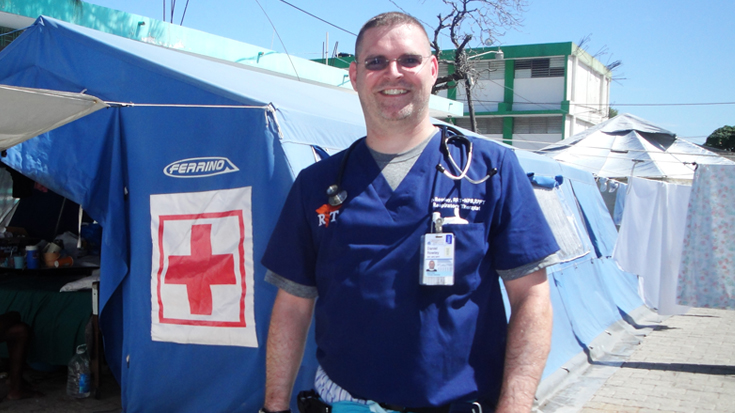
Dan Rowley loves the chance research gives him to answer important clinical questions and share the results with his peers.
Dan Rowley, MSc, RRT, RRT-ACCS, FAARC, first heard about the profession of respiratory care during his senior year of high school. He was enrolled in a health care occupations curriculum and elected to observe RTs in the ICU as part of one of his courses.
“The curriculum appeared challenging and the work environment was exciting,” he said. Preparing for a career where he could contribute to life-saving care seemed right for him and he decided to go for it.
Today Rowley serves as the respiratory therapy adult clinical coordinator at the University of Virginia Medical Center in Charlottesville.
“What I like best about my job is that every day provides me with opportunities to learn something new while caring for patients, educate existing and future health care providers, and conduct research that may advance the art and science of respiratory care while focusing on improved patient outcomes,” Rowley said.
An early spark
The latter has been a part of Rowley’s career since the beginning.
“My interest in respiratory care research was sparked early in my career while working clinically,” he said. “Each day provided a plethora of opportunities to question effectiveness of respiratory therapies as they relate to important clinical outcomes.”
Rowley has conducted a number of trials over the years and last year he presented an abstract at the Open Forum in Las Vegas that was included in the prestigious Editors’ Choice session.
The study, “A Randomized Controlled Trial Comparing the Effectiveness of Lung Expansion Therapy Following Upper Abdominal Surgery in Adult Human Subjects,” grew out of his experiences providing post-operative lung inflation therapy with incentive spirometry to reduce risk of, or treat, atelectasis. Noting that an escalation of that therapy may include PEP therapy, and recent advancements in Electrical Impedance Tomography provide the opportunity to visualize distribution of ventilation during lung expansion therapy, he saw an opportunity to embark on a project.
“Recognizing the dearth of high quality scientific literature supporting lung expansion therapies among non-intubated post-operative patients receiving IS and PEP therapy, I thought that designing a clinical trial may help us to better understand if there is a difference in distribution of ventilation and post-operative pulmonary complication risks between groups receiving one of the allocated therapies,” Rowley said.
Hard work required
For Rowley, the best part of conducting clinical research is learning something new and then sharing it with the medical community at large to improve overall understanding of the topic at hand.
The hardest part? Rowley says limited resources can be a strain, especially when dealing with human subjects, and the sheer volume of the work involved can be a challenge. Not only will the researcher need to write an extensive study protocol, but also build and maintain a study codebook, screen and enroll prospective subjects, maintain communication with study subjects and multidisciplinary teams, and use statistical programs to generate output tables and graphs that assist with interpreting data gained from the study.
“This requires additional knowledge of which statistical methods to apply that will answer the research question or questions,” he said. “Human subject study designs also require IRB application approval and national registry before enrollment commences. These efforts can be time- and resource-taxing on a team of RT researchers.”
Four pieces of advice
Dan Rowley has four bits of advice for anyone interested in embarking on a clinical research study for the first time —
- Learn to become proficient with a statistical software and the fundamentals of common statistical methods. This is necessary for maintaining a research codebook and to assure that the correct statistical methods are applied to answer the research question.
- Get a mentor. A mentor can help you navigate the nuances of study protocol development, IRB process, and national registry (if applicable).
- Do not succumb to fatigue. The longer a study continues, the more likely you will want to lose hope for finalizing an important project. Stay with it. Do not lose focus on the goal. Avoid fatigue errors. And most importantly, ask for help when help is necessary.
- Finally, share your findings with others at meetings, such as at the AARC Congress Open Forum, and through manuscript submission to a peer reviewed medical journal like Respiratory Care.
The 2019 Open Forum will take place during AARC Congress 2019 in New Orleans, LA, Nov. 9-12. Check out the this year’s abstracts and then make plans now to attend.





